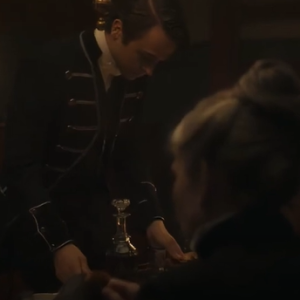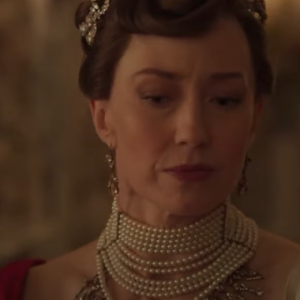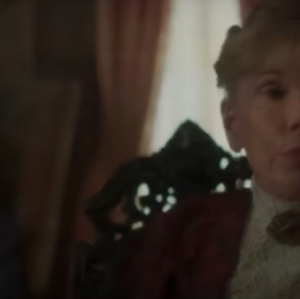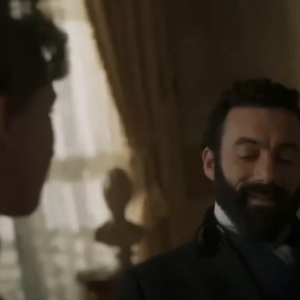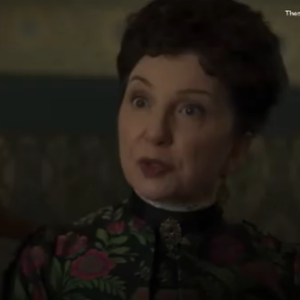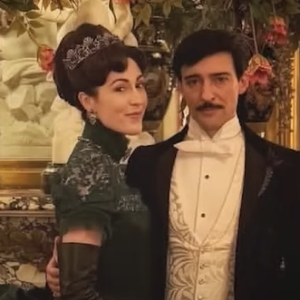The return of The Gilded Age for a third season wasn’t just another renewal announcement—it was a collective sigh of relief from devoted fans and a thunderclap of anticipation for the cast and creators. Carrie Coon, Christine Baranski, and Morgan Spector—the actors behind the indomitable Bertha Russell, the imperious Agnes van Rhijn, and the calculating yet vulnerable George Russell—shared their raw reactions to the moment they discovered the show was coming back. For them, it wasn’t a simple confirmation—it was a resurrection. Amid strikes and contract expirations, the shadow of cancellation loomed like a storm cloud over their ornate 1880s world. Morgan confessed he believed it was over. Carrie laughed about being ready to squeeze back into her corset. Christine painted the experience with bittersweet realism, highlighting the tight-knit camaraderie of the cast and the sense of shared purpose among the crew in New York. Together, they described the production as a “nerdy theater camp,” filled with singing, laughter, and a bond that only Broadway veterans and character actors could understand. Off-camera, they weren’t cold aristocrats—they were performers stealing bites of food between takes and bursting into unrehearsed musical numbers, their laughter echoing through the Gilded sets like ghostly joy from another time.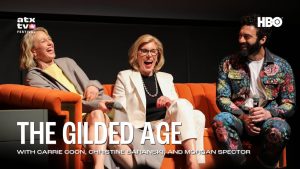
Behind every exquisite scene, behind every sly glance and devastating line of dialogue, lies the meticulous vision of Julian Fellowes—the mastermind of Downton Abbey—who crafted these American aristocrats with the same complexity he bestowed upon his English lords and ladies. For Carrie, the blueprint was clear: Bertha Russell was born from the bold, socially ruthless DNA of Alva Vanderbilt. Her climb through society was not mere fiction—it was pulled from the very pages of American history, and Fellowes made sure the parallels were unmistakable. Christine recalled meeting Fellowes long before The Gilded Age became a reality, during a fateful Emmy evening where she jokingly pitched herself for a future project, a moment that would eventually bear fruit years later. Baranski saw in Agnes the dry wit and iron resolve of her own mother—a Depression-era survivor who raised children on jelly sandwiches and Buffalo winters, walking through snow with newspapers in her shoes. Her stoic strength and no-nonsense humor, mixed with a glass of whiskey and a disdain for fools, became the foundation for Agnes van Rhijn. Meanwhile, Morgan’s George Russell emerged as a character inspired not by the predictable choice of Vanderbilt, but by the darker, more conflicted Jay Gould—a man ruthless in business, tender in his private greenhouse, and utterly fascinating in his contradictions. These weren’t simply characters—they were avatars of ambition, love, greed, and vulnerability, dancing at the edge of a rapidly transforming world.
But perhaps what makes The Gilded Age so compulsively watchable is the emotional high-wire act its characters perform every episode. George, the “robber baron” with a soft spot for orchids and a terrifying appetite for control, exists in a world where morality is a tool rather than a guide. Morgan admits even he finds himself caught between rooting for George and being repelled by him. That duality is the show’s secret weapon. At the heart of it all is George’s marriage to Bertha—a partnership of equals, forged in passion and power, but increasingly tested by ambition. Carrie’s Bertha, the firestarter of New York society, ends Season 2 with another win under her pearl-crusted belt. She dominates the opera wars with the precision of a military general, securing her seat at the cultural table. And yet, the cost is rising. There is something unsettling in how much she is willing to sacrifice for legacy, and her marriage, once a shared empire, is beginning to fracture under the weight of her conquests. As Bertha looks to her daughter’s future, projecting her unfulfilled ambition onto Gladys, we see a woman not only building monuments but quietly dismantling the very foundations of her personal life. What happens when the only world you’re allowed to control is one of ballrooms, guest lists, and velvet ropes? You control it with a vengeance.
Christine and Cynthia Nixon’s evolving dynamic as Agnes and Ada is another layer of brilliance. In previous seasons, Agnes ruled the household with her barbed tongue and commanding presence, while Ada fluttered in the background with warmth and romantic hope. But in a stunning turn of events, Ada finds herself at the helm, flipping the entire power structure of their home. For Christine, it’s a delicious opportunity to play someone losing control, to fall from her austere throne. The possibilities of Ada embracing her bleeding-heart nature and opening their doors to strays, artists, and chaos is both hilarious and tragic—a Shakespearean inversion in corsets. Agnes may be forced to sulk in the drawing room with her sherry, surrounded by the very Bohemians she’s spent a lifetime loathing. That shift mirrors the deeper themes of the series—the old guard crumbling under the weight of new money, new values, and new voices. Bertha and George are the bleeding edge of that change, as are Ada and Agnes in their own cloistered way. The men are building railroads and empires, but the women are shaping the culture. As Carrie notes, the women weren’t just ornamental—they were strategic. They channeled ambition through their children, learned etiquette as a weapon, and manipulated society with a finesse that left many of the men trailing in their wake. 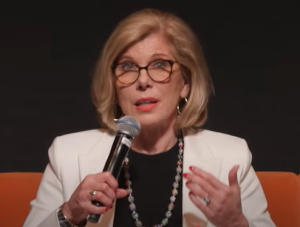
As The Gilded Age barrels toward its third season premiere, the stakes have never been higher. The opera box battle may be over, but the wars for power, love, and legacy are only beginning. Julian Fellowes has created a glittering chessboard where every character plays with deadly seriousness, masked behind polite smiles and exquisite gowns. And now, with rumors of a potential Downton Abbey crossover in Season 4, the possibilities for drama are limitless. Will George find solace in the arms of another? Will Bertha bend or break under the weight of her own ambition? Will Ada’s newfound authority ignite joy or disaster? Will Agnes ever soften, or will her icy resolve freeze everyone out for good? These are not just soap opera questions—they are moral and emotional crucibles. The Gilded Age thrives not because of its opulence, but because of the heartbeats beneath the brocade. It is a story of survival wrapped in silks, a war of identity fought in tea rooms, and a mirror held up to the past that still reflects our present. The countdown to June 22 begins, and with it, the return of one of television’s most opulent, biting, and soulfully human dramas.
